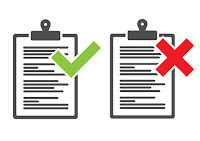Writers tend to fall into one of two broad categories: plotters or pantsers.
Plotters are those individuals who tend to have every aspect of their story recorded in a detailed outline before they ever put pen to paper, or fingers to keyboard as the case may be. The most die-hard of outliners may even include sticky notes and color-coding in their process. I am both in awe of and somewhat baffled by these people. While I am a huge fan of both sticky notes and brightly colored pens, outlines are beyond me.
You see, I fall firmly into the pantser category. What's a pantser? In short, we don't outline, we fly - or in this case, write - by the seat of our pants. Outlines just don't work for me and never have, no matter how many well-intentioned teachers insisted on them. As much as I enjoyed my various Enlish/literature classes, the constant insistence on outlines brought out my rebellious streak. I never wrote an outline until after I had finished the paper. I never understood how I was supposed to know what I was going to write until I wrote it. I still don't.
 | |
| Outline? No outline? There's no one right way to write | . |
A friend and aspiring writer recently contacted me with a few writing-related questions. She was taking an online writing class sponsored by a well-known author and said that he had them doing a lot of outlines and wanted to know if I did them. I told her that I do not. Of course, he is a best-selling author and I'm not, so my advice might not carry as much weight but I think the most important thing is to find what works for you and run with it. In my case, when I begin a story I know who my main characters are, how they meet, how the story begins, and how it ends. I also have a few random scenes and pieces of dialog that fit somewhere in between - the rest comes as I write.
I enjoy seeing the story unfold as I write. My husband is still baffled as to how my characters can do things that I don't plan but it happens all the time. When I was writing Dial V for Vampire (released by Fire Star Press last year), the hero suddenly offered the heroine a job. It caught me completely off-guard and wasn't what I had planned at all. I had to take a step back and rethink my story line a bit but I think the story worked better for the change.
I could probably force myself to outline but I think my stories would suffer for it if I did. I know me and if I commit an idea to an outline, I'm probably going to make myself to stick with it even if it isn't working. Not having an outline hanging over my head gives me more flexibility. In my newest short story, It's Meow or Never, I had a hard time writing the ending. I knew how I wanted the story to end but it just wasn't working. Every time I sat down to work on it I just got bogged down. I started thinking of it as the story that refused to end. Then one day I had a flash of inspiration - I removed the hero's fluffy white kitten and replaced it with a pit bull named Elvis and bam. The end of the story fell into place like magic. Who knew a pit bull could make such a difference?
Fellow authors, are you a plotter or a pantser?
Sign up for my
newsletter here: http://madmimi.com/signups/112968/join
Amazon Author Page: http://amazon.com/author/isabellanorse

I storyboard my books; I was always a big fan of outlining in school. I like to have a specific idea of what I'm going to write. That said, I don't write in order once I've done my outline. I follow where the story takes me, which is, sometimes, not according to the outline. I'm fine with that. I continue, as ever, to be a walking oxymoron.
ReplyDeleteOddly enough, I generally write in order even though I don't outline.
DeleteThis comment has been removed by the author.
DeleteI'm a pantser. I don't outline, and I hardly plot. I write in scenes then weave them together as the story unfolds. I know my endings before I know any other part of the story.
ReplyDeleteYay, another pantser! I always seem to be surrounded by plotters, LOL.
DeleteI'm a plotter--not a rigid, every detail must be outlined, but the movement of the story from beginning to end is plotted out. When I say outlined, it's more like a synopsis done in advance instead of when it's finished. I also use flexibility when I'm inspired with a better idea than the original and I'll tweak up my outline in that case.
ReplyDeleteI seldom write my stories in order, but instead, write out a scene that happens to come to mind whether it's a few chapters forward or near the end.
All the best to you, Isabella.
I'm a plotter too. I need a rough outline of where I'm going, although forks in the road certainly spring up sometimes changing that rough outline. I've used Joseph Campbell's Hero's Journey for every book I've written. It gives me a solid foundation, yet allows for creativity.
ReplyDeleteI attended a workshop on outlining with Elizabeth Engstrom. She made a good case for an outline but I can't seem to make it work for me. I tried, Elizabeth, truly I did...
ReplyDeleteAparently Ian Rankin said that if he doesn't know what's going to happen next, his readers can't second guess him.
ReplyDelete